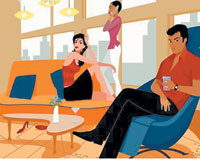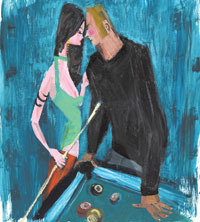| Mirror
Magazine |
||||
|
After
you… But to be fair, it must be conceded that gentlemen do exist in our society. True, it’s not what it used to be in the times of our grandparents, but nonetheless it’s not too bleak a picture either. Nobody’s denying the existence of a few good men who practise the art of being ‘gentlemen’. But what with Women’s Liberation and the feminist movement, sometimes even a genuine attempt at being nice is scoffed at by women who regard it as a form of male chauvinism. We’re looking at a very grey area here: In this fast-paced, rat-race world of ours, does the concept of chivalry hold any meaning? Is it dead, or still surviving? Are we trying to hang on to a dying culture? Knight
in shining armour Not every guy can make such a claim. You’d be lucky if you don’t find the door slam in your face, even if it may not be intentional. Chivalry, at its inception, was a system of values and ideals of moral and social conduct practised by knights in medieval Europe. In its institutional form, chivalry was an informal, international order to which many, but not all of the ruling class (nobility) belonged. The word is derived from the Latin caballus (horse) through the French word chevalier (‘horseman’ or knight). Chivalry was born of feudalism in the late Middle Ages introducing a new code, where knights were expected to treat their fellow knights and inferiors with respect and goodwill. Thus, the system of social etiquette we refer to as ‘chivalry’ was born. With bravery and loyalty becoming the vanguard of the code of chivalry, the system eventually forbade knights to attack peasants, women, priests and merchants. But by the end of the Middle Ages, the usefulness of chivalry had declined, and the practice survived only as a code of behaviour. In days gone by, a man was even expected to challenge the offender to a duel, if he dared insult his lady. The legacy of medieval chivalry was significant, as the knight was the ancestor of the modern ‘gentleman’. By the beginning of the 19th century the figure of the knight was romanticized by authors like Sir Walter Scott with his tales of valiant warriors and damsels in distress. History has it that another Walter, (Raleigh it was), laid his cloak in a puddle of mud so that Queen Elizabeth I could walk over it and not sully her dainty feet! Chivalry
and the feminist “Chivalry is a nice thing so long as the guy is genuine,” says *Surani (19). Unfortunately some men adopt a very macho condescending attitude, like when they offer to carry a woman’s luggage, she says. “They give you the impression that you can’t do it for peanuts, and that’s why they are helping out.” If that is the case, no thanks! The fact of the matter is, one of the founding purposes of chivalry was apparently the protection of women. So in an age of women’s rights and equality for all, does chivalry actually have any meaning at all? And has feminism put the brakes on chivalry? “Chivalry ‘IS’ dead, and it jolly well should be, “ says *Roshan (23), adding that chivalry was destroyed when women asked for equal rights. “Equal means equal. You can’t ask for the same rights and at the same time expect to be treated like royalty,” he says. “No more holding doors, giving seats on buses, paying for flowers and dinner-dates, changing flat tyres,” he says. “They keep screaming about equality, so let them do it themselves!” Udara (23) says that, “Chivalry was relevant at a time when women couldn’t take care of themselves.” Now that women no longer need to be ‘protected’ so to speak, there’s no necessity for chivalry either, he says. Others claim that equality and chivalry just do not mix. “You obviously can’t have them both,” says Eswaran (26), “you can’t be equal and be expected to be treated differently.” It’s like being in control of those aspects of the man’s behaviour that benefit a woman, while at the same time enjoying the rights and privileges of equality. “Some girls don’t want guys to hold doors for them,” he says, adding that the better the two parties know each other, the lesser the degree of chivalry. Especially in today’s society, where girls and guys can be ‘best buddies’, it would be just a little out of place to rush to open the door! “I think most guys use the feminist theory as an excuse so that they can do away with chivalry,” says Manisha (19). “Just because I want equal rights at work etc. it doesn’t mean that I don’t want to be treated like a lady.” Conceding that the issue of ‘equal rights’ does result in the fall of chivalry, she says family upbringing might also have some bearing on the issue. Twenty-two-year-old *Shamila is of the opinion that it’s all well for a little decline in chivalry and a change of attitude in the view of the hype over feminism and equal rights. She is quick to add, however, that it doesn’t mean every single accepted form of social etiquette has to be done away with. As the code of conduct for relationships was also derived off chivalry, she believes that it’s not necessary for a guy to play the role of ‘protector’ in contemporary society, but “you can’t possibly expect the tables to be turned, where a girl asks a guy out, pays for meals, and has to go down on her knees and ask him to marry her!” she adds. Thanks
but no thanks “When we offer to help, they don’t want it, they think we’re being chauvinistic!” exclaims one frustrated young man, adding as an afterthought that women were indeed difficult to understand! (Like men aren’t!) “So those ladies who want to see a return to chivalry might just have to accept the help offered, and encourage the practice. Men didn’t kill chivalry, women did!” he adds emphatically. The truth however is probably that chivalry is not dead, at least not yet. It is just respected less and less by both genders for different reasons. Women claim that men are no longer ‘gentlemen’ because they tend to put on a ‘macho’ type image, which is an immediate turn-off. Men argue that the concept of chivalry is an outdated one, putting men at a disadvantage. The fact remains that equal rights did not kill chivalry, but it may have given men the loophole they were looking for. Therefore, has
it now become the age of ‘in with equality, out with chivalry’?
Or is it possible to get the best of both worlds? Do we demand equal
rights, but like to be ‘treated like a lady’, or do
we want to be treated like one of the guys? Tough situation we’re
in now, aren’t we, ladies? |
||||
Copyright © 2001 Wijeya Newspapers
Ltd. All rights reserved. |
 Is
chivalry dead, we ask in indignation when we see a hefty young man
push past a pregnant woman to grab a seat on the bus. This is a
scene we come across ever so often. Indeed a majority of the female
population believes that chivalry has perished. “Fat chance
of bumping into a gentleman today,” laments a disappointed
female, “most guys are really coarse and ill-mannered.”
Is
chivalry dead, we ask in indignation when we see a hefty young man
push past a pregnant woman to grab a seat on the bus. This is a
scene we come across ever so often. Indeed a majority of the female
population believes that chivalry has perished. “Fat chance
of bumping into a gentleman today,” laments a disappointed
female, “most guys are really coarse and ill-mannered.”
 “I
don’t think anyone can say that chivalry is dead, though it’s
not as common as it was,” says *Wasim (20), heading the list
of guys who very gallantly proclaimed that chivalry was indeed,
still alive. “Well, I do open doors for people, but it’s
not like I hold doors open only for girls, though they do get priority,”
he adds.
“I
don’t think anyone can say that chivalry is dead, though it’s
not as common as it was,” says *Wasim (20), heading the list
of guys who very gallantly proclaimed that chivalry was indeed,
still alive. “Well, I do open doors for people, but it’s
not like I hold doors open only for girls, though they do get priority,”
he adds.